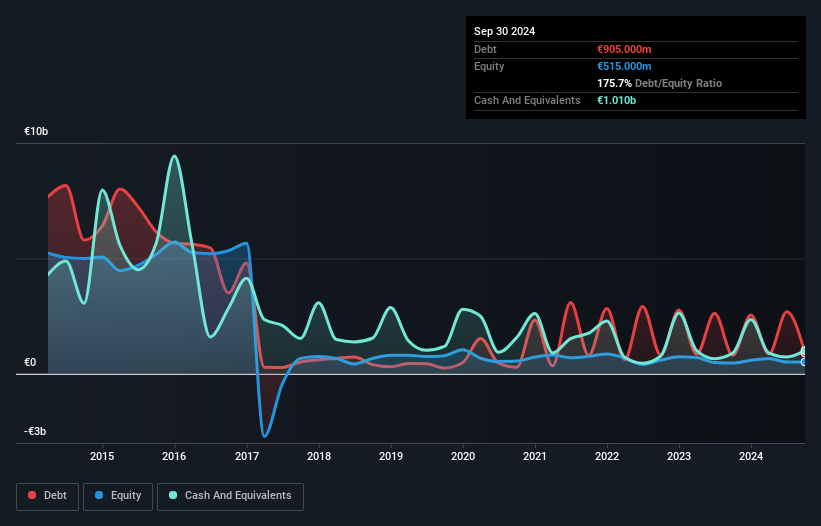Warren Buffett famously said, 'Volatility is far from synonymous with risk.' It's only natural to consider a company's balance sheet when you examine how risky it is, since debt is often involved when a business collapses. As with many other companies Ceconomy AG (ETR:CEC) makes use of debt. But the real question is whether this debt is making the company risky.
When Is Debt Dangerous?
Generally speaking, debt only becomes a real problem when a company can't easily pay it off, either by raising capital or with its own cash flow. If things get really bad, the lenders can take control of the business. However, a more common (but still painful) scenario is that it has to raise new equity capital at a low price, thus permanently diluting shareholders. By replacing dilution, though, debt can be an extremely good tool for businesses that need capital to invest in growth at high rates of return. When we examine debt levels, we first consider both cash and debt levels, together.
See our latest analysis for Ceconomy
What Is Ceconomy's Debt?
You can click the graphic below for the historical numbers, but it shows that as of September 2024 Ceconomy had €905.0m of debt, an increase on €799.0m, over one year. But on the other hand it also has €1.01b in cash, leading to a €105.0m net cash position.

A Look At Ceconomy's Liabilities
The latest balance sheet data shows that Ceconomy had liabilities of €7.07b due within a year, and liabilities of €2.55b falling due after that. On the other hand, it had cash of €1.01b and €2.14b worth of receivables due within a year. So its liabilities total €6.48b more than the combination of its cash and short-term receivables.
This deficit casts a shadow over the €1.15b company, like a colossus towering over mere mortals. So we'd watch its balance sheet closely, without a doubt. After all, Ceconomy would likely require a major re-capitalisation if it had to pay its creditors today. Given that Ceconomy has more cash than debt, we're pretty confident it can handle its debt, despite the fact that it has a lot of liabilities in total.
We note that Ceconomy grew its EBIT by 26% in the last year, and that should make it easier to pay down debt, going forward. The balance sheet is clearly the area to focus on when you are analysing debt. But ultimately the future profitability of the business will decide if Ceconomy can strengthen its balance sheet over time. So if you're focused on the future you can check out this free report showing analyst profit forecasts.
Finally, a company can only pay off debt with cold hard cash, not accounting profits. Ceconomy may have net cash on the balance sheet, but it is still interesting to look at how well the business converts its earnings before interest and tax (EBIT) to free cash flow, because that will influence both its need for, and its capacity to manage debt. Happily for any shareholders, Ceconomy actually produced more free cash flow than EBIT over the last three years. That sort of strong cash generation warms our hearts like a puppy in a bumblebee suit.
Summing Up
While Ceconomy does have more liabilities than liquid assets, it also has net cash of €105.0m. And it impressed us with free cash flow of €645m, being 244% of its EBIT. So although we see some areas for improvement, we're not too worried about Ceconomy's balance sheet. Over time, share prices tend to follow earnings per share, so if you're interested in Ceconomy, you may well want to click here to check an interactive graph of its earnings per share history.
When all is said and done, sometimes its easier to focus on companies that don't even need debt. Readers can access a list of growth stocks with zero net debt 100% free, right now.
New: AI Stock Screener & Alerts
Our new AI Stock Screener scans the market every day to uncover opportunities.
• Dividend Powerhouses (3%+ Yield)
• Undervalued Small Caps with Insider Buying
• High growth Tech and AI Companies
Or build your own from over 50 metrics.
Have feedback on this article? Concerned about the content? Get in touch with us directly. Alternatively, email editorial-team (at) simplywallst.com.
This article by Simply Wall St is general in nature. We provide commentary based on historical data and analyst forecasts only using an unbiased methodology and our articles are not intended to be financial advice. It does not constitute a recommendation to buy or sell any stock, and does not take account of your objectives, or your financial situation. We aim to bring you long-term focused analysis driven by fundamental data. Note that our analysis may not factor in the latest price-sensitive company announcements or qualitative material. Simply Wall St has no position in any stocks mentioned.
About XTRA:CEC
Undervalued with reasonable growth potential.
Similar Companies
Market Insights
Community Narratives



